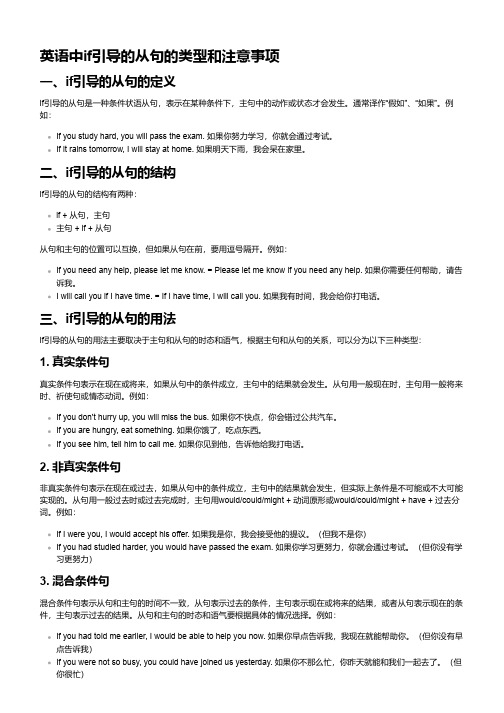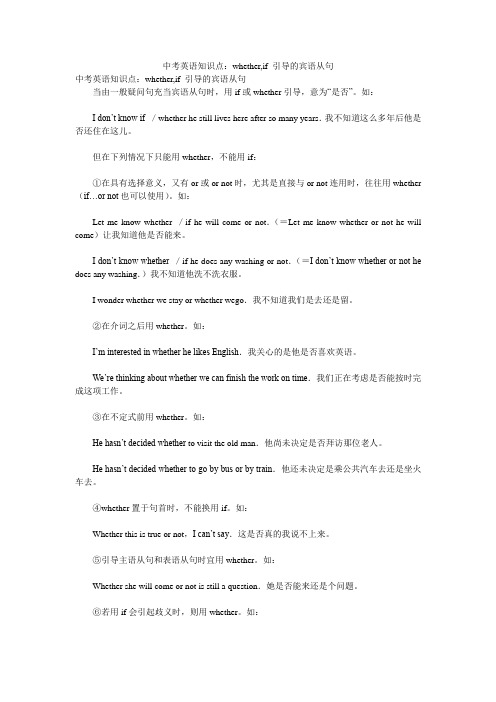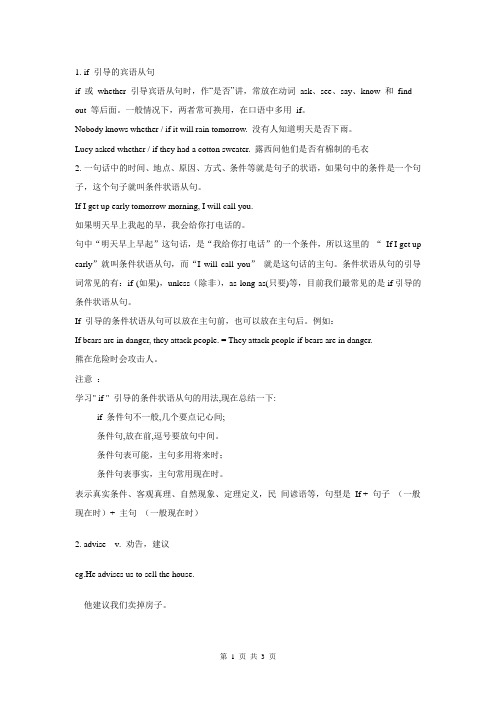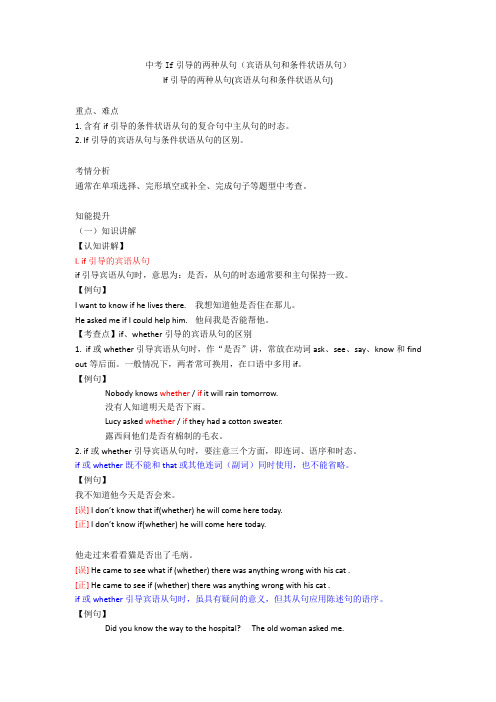If引导的两种从句(宾语从句和条件状语从句)
if条件状语从句和宾语从句的区别

if条件状语从句和宾语从句的区别
if条件状语从句和宾语从句的区别
if条件状语从句和宾语从句常常被混淆,有时,甚至会出现对两者的混淆使用。
他们之间的区别是显而易见的,我们可以通过以下几点来进行区分。
首先,if条件状语从句不能作宾语,而宾语从句则可以作宾语。
其次,if条件状语从句是一种从属的状语,而宾语从句则是它所修饰的动词的宾语。
再次,if条件状语从句中的主语和谓语动词都是动词不定式,而宾语从句中的主语和谓语动词则可以是任何形式的动词。
最后,if条件状语从句中的时态是一般现在时或将来时,而宾语从句则可以有多种时态。
总的来说,if条件状语从句和宾语从句之间的区别主要在于它们所具有的功能不同,它们各自所具有的形式也是不同的。
因此,两者之间的区别是显而易见的,我们在使用的时候应该注意这一点。
- 1 -。
If状语从句与宾语从句的区分和应用

If 的应用一、区分(注意与另一连接词that区分)↑真实→条件状语从句→主将从现原则如果过去主:主语+ should/would/could/might + have done从:if + 主语+ had + done非真实→虚拟语气现在主:主语+should/would/could/might + do从:if +主语+过去时(be用were)If将来主:主语+ should + do从:a)if + 主语+ were to dob)if + 主语+ should/would/could/might + doc)if + 主语+ did(动词过去式)/were 是否→宾语从句↓(注意与whether区分)二、条件状语从句If在条件状语从句和虚拟语气中,译为“如果”。
不同的是,条件状语从句中,if是表示真实存在,客观事实的。
需要注意区分以下时态:1. 主将从现E.g. When I grow up, I will be a policeman.2. 主祈从现(祈使句,从句用一般现在时)E.g. Don’t laugh at me when I make a mistake.3. 主情从现(主句含有情态动词的一般现在时,根据情况需要从句多用一般现在时)E.g. You should be quiet when you are in the library.注意:①if 引导的条件状语从句,既可以放在主句之前也可以放在主句之后。
当从句置于主句之前时,常用逗号与主句隔开。
②在if引导的条件状语从句中,主句时一般将来时时,不能使用be going to结构,而要用will。
②在if引导的条件状语从句中不能使用some,而要用any。
④同义句转换,if引导的条件状语从句可转换成简单句,如:“祈使句+and/or+简单句”结构。
其中and表示句意顺承,or表示句意转折。
三、虚拟语气If 表示假设、推测、不可能实现时,使用虚拟语气,同样译为“如果”,分三种情况:1.过去主:主语+ should/would/could/might + have done从:if + 主语+ had + doneE.g. If I had got up early yesterday, I wouldn't have been late.2.现在主:主语+should/would/could/might + do从:if +主语+过去时(be用were)E.g. If I were you, I would change myself for her.3.将来主:主语+ should + do从:a)if + 主语+ were to dob)if + 主语+ should/would/could/might + doc)if + 主语+ did(动词过去式)/wereE.g.If it were to rain, I should buy an umbrella.If he should dare to show his face again, I should give him a piece of my mind.If he dared to show his face again, I should give him a piece of my mind.四、宾语从句If 在宾语从句中的应用与意思与状语从句中不同,译为“是否”,常放在动词ask, see,say,know和find out等后面(注意与连接词“whether”区分,在之后会给出具体区分方法)。
If引导的宾语从句和条件状语从句

If带领的宾语从句战条件状语从句之阳早格格创做【沉面、易面】1. 含有if带领的条件状语从句的复合句中主从句的时态.2. If带领的宾语从句取条件状语从句的辨别.【考情分解】常常正在单项采用、完形挖空或者补齐、完毕句子等题型中考查,分值约3—4分.【知识道解】宾语从句【例句】I want to know if he lives there.He asked me if I could help him.【考查面】if、whether带领的宾语从句的辨别:从含意、连词汇、语序战时态等圆里区别.1.含意if或者whether带领宾语从句时,做“是可”道,二者常可换用,正在心语中多用if.【例句】Nobody knows whether / if it will rain tomorrow.Lucy asked whether / if they had a cotton sweater.2.取连词汇(副词汇)闭系if或者whether既没有克没有及战that 或者其余连词汇(副词汇)共时使用,也没有克没有及简略.【例句】[误] I don’t know that if(whether) he will come here today.[正] I don’t know if(whether) he will come here today.[误] He came to see what if (whether) there was anything wrong with his cat .[正] He came to see if (whether) there was anything wrong with his cat .3.语序if或者whether带领宾语从句时,虽具备疑问的意义,但是其从句应用报告句的语序.【例句】The old woman asked me if / whether I knew the way to the hospital.4.时态if或者whether带领的宾语从句应战主句的时态脆持普遍.即主句为普遍当前时,从句用任一种时态;主句为普遍往日时,从句则用往日时中的任一种时态.【例句】I don’t know if (whether) he has come here.Tom asked if (whether) I had read the book.5.只可用whether的情况(1)正在动词汇没有定式之前只可用whether【例句】I can’t decide whether to stay.(2)正在whether …or not 的牢固拆配中【例句】I want to know whether it’s good news or not.(3)正在介词汇后,只可用whether【例句】His father is worried about whether he loses his work.(4)用if会引起歧义时【例句】Could you tell me if you know the answer? 那句话有二种意义:“您能报告尔您是可了解问案吗?”或者“如果您了解问案,请报告尔,佳吗?”. 如用whether则可预防歧义.状语从句if带领的条件状语从句:从含意、时态战用法三个圆里去钻研.1.含意条件状语从句是正在复合句中做条件状语的句子,if做”如果、假若”道.【例句】 You will catch the bus if you get up early.2.时态(1)主祈从现:主句是祈使句, 从句是由if带领的使用普遍当前时的句子.【例句】If you want to go, please tell me.Print the photo if you like it.(2)主将从现:指if带领的条件状语从句用普遍当前时,主句用普遍将去时.【例句】If it doesn’t rain tomorrow, we’ll go to t he Great Wall.If you don’t get up early, you will be late for school.(3)主情从现当主句是普遍当前时(含情态动词汇can, may, must等的句子),从句也用普遍当前时.【例句】 You must see the doctor if you are ill.3.用法(1)位子if带领的条件状语从句,既可搁正在主句之前也可搁正在主句之后.当从句置于主句之前时,时常使用逗号取主句隔启.【例句】You will catch the bus if you get up early. =Ifyou get up early, you will catch the bus.(2)正在if带领的条件状语从句中,当主句是普遍将去常常,没有克没有及使用be going to结构,而要用will.【例句】I’ll help you with your English if I am freetomorrow.(3)正在if带领的条件状语从句中没有克没有及使用some,而要用any.【例句】If you have any questions to ask, please cometo my office.(4)共义句变换,if带领的条件状语从句可变换成简朴句,其要领如下:“祈使句+and/ or+简朴句”结构.其中and表示句意逆启,or表示句意转合.【例句】If you work hard, you’ll pass the exam.=Work hard, and you’ll pass the exam. If you don’thurry up, you’ll be late.=Hurry up, or you’ll be late.。
if 从句——if 引导的条件状语从句和宾语从句

一
什么 是宾语从句?
试比较
简单句 We know him. 主s 谓v 宾 o We know he likes English. 复合句
主s 谓v
主s 谓v 宾o
宾o
宾语从句就是由一个句子来构成主句的宾语
3.由从属连词 whether, if 引导的宾语从句
if/whether 引导宾语从句 表示“是否”之义,在句中 不充当句子成份。 if/whether可互换, 但whether…or not为固定搭配. e.g. I want to know if/whether she is right . They didn’t know whether Tom could come back or not . 看一看:I don’t know if it will rain tomorrow.If it rains ,I’ll stay at home. I want to know when he will come back.When he comes back, please tell me. 想一想:when和if 可以引导什么从句?它们的时态有什么特 点? when和if 既可以引导宾语从句,也可以引导状语从句。原则。 在宾语从句中,时态根据需要确定;在状语从句中,遵循主将 从现的
链接中考
• 36. If our government __ _ attention to controlling food safety now, our health _ ___ in danger.(2012年中考) • A. won't pay; is B. doesn't pay; is C. won't pay; will be D. doesn't pay; will be
英语中if引导的从句

英语中if引导的从句的类型和注意事项一、if引导的从句的定义if引导的从句是一种条件状语从句,表示在某种条件下,主句中的动作或状态才会发生。
通常译作“假如”、“如果”。
例如:If you study hard, you will pass the exam. 如果你努力学习,你就会通过考试。
If it rains tomorrow, I will stay at home. 如果明天下雨,我会呆在家里。
二、if引导的从句的结构if引导的从句的结构有两种:if + 从句,主句主句 + if + 从句从句和主句的位置可以互换,但如果从句在前,要用逗号隔开。
例如:If you need any help, please let me know. = Please let me know if you need any help. 如果你需要任何帮助,请告诉我。
I will call you if I have time. = If I have time, I will call you. 如果我有时间,我会给你打电话。
三、if引导的从句的用法if引导的从句的用法主要取决于主句和从句的时态和语气,根据主句和从句的关系,可以分为以下三种类型:1. 真实条件句真实条件句表示在现在或将来,如果从句中的条件成立,主句中的结果就会发生。
从句用一般现在时,主句用一般将来时、祈使句或情态动词。
例如:If you don't hurry up, you will miss the bus. 如果你不快点,你会错过公共汽车。
If you are hungry, eat something. 如果你饿了,吃点东西。
If you see him, tell him to call me. 如果你见到他,告诉他给我打电话。
2. 非真实条件句非真实条件句表示在现在或过去,如果从句中的条件成立,主句中的结果就会发生,但实际上条件是不可能或不大可能实现的。
中考英语知识点:whether,if 引导的宾语从句

中考英语知识点:whether,if 引导的宾语从句中考英语知识点:whether,if 引导的宾语从句当由一般疑问句充当宾语从句时,用if或whether引导,意为“是否”。
如:I don’t know if /whether he still lives here after so many years.我不知道这么多年后他是否还住在这儿。
但在下列情况下只能用whether,不能用if:①在具有选择意义,又有or或or not时,尤其是直接与or not连用时,往往用whether (if…or not也可以使用)。
如:Let me know whether /if he will come or not.(=Let me know whether or not he will come)让我知道他是否能来。
I don’t know whether /if he does any washing or not.(=I don’t know whether or not he does any washing.)我不知道他洗不洗衣服。
I wonder whether we stay or whether wego.我不知道我们是去还是留。
②在介词之后用whether。
如:I’m interested in whether he likes English.我关心的是他是否喜欢英语。
We’re thinking about whether we can finish the work on time.我们正在考虑是否能按时完成这项工作。
③在不定式前用whether。
如:He hasn’t decided whether to visit the old man.他尚未决定是否拜访那位老人。
He hasn’t decided whether to go by bus or by train.他还未决定是乘公共汽车去还是坐火车去。
新目标英语八年级If引导的宾语从句与状语从句

1. if 引导的宾语从句if 或whether 引导宾语从句时,作“是否”讲,常放在动词ask、see、say、know 和find out 等后面。
一般情况下,两者常可换用,在口语中多用if。
Nobody knows whether / if it will rain tomorrow. 没有人知道明天是否下雨。
Lucy asked whether / if they had a cotton sweater. 露西问他们是否有棉制的毛衣2.一句话中的时间、地点、原因、方式、条件等就是句子的状语,如果句中的条件是一个句子,这个句子就叫条件状语从句。
If I get up early tomorrow morning, I will call you.如果明天早上我起的早,我会给你打电话的。
句中“明天早上早起”这句话,是“我给你打电话”的一个条件,所以这里的“If I get up early”就叫条件状语从句,而“I will call you”就是这句话的主句。
条件状语从句的引导词常见的有:if (如果),unless(除非),as long as(只要)等,目前我们最常见的是if引导的条件状语从句。
If 引导的条件状语从句可以放在主句前,也可以放在主句后。
例如:If bears are in danger, they attack people. = They attack people if bears are in danger.熊在危险时会攻击人。
注意:学习" if " 引导的条件状语从句的用法,现在总结一下:if 条件句不一般,几个要点记心间;条件句,放在前,逗号要放句中间。
条件句表可能,主句多用将来时;条件句表事实,主句常用现在时。
表示真实条件、客观真理、自然现象、定理定义,民间谚语等,句型是If + 句子(一般现在时)+ 主句(一般现在时)2. advise v. 劝告,建议eg.He advises us to sell the house.他建议我们卖掉房子。
中考If引导的两种从句(宾语从句和条件状语从句) (4)

【例句】
我不知道他今天是否会来。
[误]I don’t know that if(whether) he will come here today.
[正]I don’t know if(whether) he will come here today.
如果明天下雨,我们就不去长城了。
(3)在if引导的条件状语从句中,当主句是一般将来时时,不能使用be going to结构,而要用will。
【例句】
I’ll help you with your English if I am free tomorrow.
如果明天我有空,我会帮助你学英语。
(4)在if引导的条件状语从句中不能使用some,而要用any。
他走过来看看猫是否出了毛病。
[误]He came to see what if (whether) there was anything wrong with his cat .
[正]He came to see if (whether) there was anything wrong with his cat .
如果你想去溜冰,穿上暖和的衣服。
如果主句是一般将来时,从句必须用一般现在时。
【例句】
You will be late for school if you get up late.
如果你起晚了,你上学将迟到。
If it rains tomorrow, we won’t go to the Great Wall.
我想知道它是不是好消息。
在介词后,只能用whether:
【例句】
His father is worried about whether he loseshis work.
- 1、下载文档前请自行甄别文档内容的完整性,平台不提供额外的编辑、内容补充、找答案等附加服务。
- 2、"仅部分预览"的文档,不可在线预览部分如存在完整性等问题,可反馈申请退款(可完整预览的文档不适用该条件!)。
- 3、如文档侵犯您的权益,请联系客服反馈,我们会尽快为您处理(人工客服工作时间:9:00-18:30)。
重点、难点1. 含有if引导的条件状语从句的复合句中主从句的时态。
2. If引导的宾语从句与条件状语从句的区别。
考情分析通常在单项选择、完形填空或补全、完成句子等题型中考查,分值约3—4分。
知能提升(一)知识讲解【认知讲解】I. if引导的宾语从句if 引导宾语从句时,意思为:是否,从句的时态通常要和主句保持一致。
【例句】I want to know if he lives there. 我想知道他是否住在那儿。
He asked me if I could help him. 他问我是否能帮他。
【考查点】if、whether引导的宾语从句的区别1. if或whether引导宾语从句时,作“是否”讲,常放在动词ask、see、say、know和find out等后面。
一般情况下,两者常可换用,在口语中多用if。
【例句】Nobody knows whether / if it will rain tomorrow.没有人知道明天是否下雨。
Lucy asked whether / if they had a cotton sweater.露西问他们是否有棉制的毛衣。
2. if或whether引导宾语从句时,要注意三个方面,即连词、语序和时态。
if或whether既不能和that 或其他连词(副词)同时使用,也不能省略。
【例句】我不知道他今天是否会来。
[误] I don’t know that if(whether) he will come here today.[正] I don’t know if(whether) he will come here today.他走过来看看猫是否出了毛病。
[误] He came to see what if (whether) there was anything wrong with his cat .[正] He came to see if (whether) there was anything wrong with his cat .if或whether引导宾语从句时,虽具有疑问的意义,但其从句应用陈述句的语序。
【例句】Did you know the way to the hospital The old woman asked me.The old woman asked me if / whether I knew the way to the hospital.老妇人问我是否知道去医院的路。
if或whether引导的宾语从句应和主句的时态保持一致。
即主句为一般现在时,从句用任一种时态;主句为一般过去时,从句则用过去时中的任一种时态。
【例句】I don’t know if (whether) he has come here.我不知道他是否来过这儿。
Tom asked if (whether) I had read the book.汤姆问我是否看过这本书。
3. 只能用whether的情况在动词不定式之前只能用whether:【例句】I can’t decide whether to stay.我不能决定是否留下。
在whether …or not 的固定搭配中:【例句】I want to know whether it’s good news or not.我想知道它是不是好消息。
在介词后,只能用whether:【例句】His father is worried about whether he loses his work.他的父亲担心他是否会失去工作。
用if会引起歧义时:【例句】Could you tell me if you know the answer这句话有两种意思:“你能告诉我你是否知道答案吗”或“如果你知道答案,请告诉我,好吗”。
如用whether则可避免歧义。
【考题链接】I don’t know _________ they could pass the exam or not.A. whyB. ifC. thatD. whether答案:D解题思路:本题考查if与whether的区别,在whether…or not的固定搭配中通常只用whether。
II. if引导的条件状语从句1.含义条件状语从句是在复合句中作条件状语的句子。
表示假如有从句的动作发生就会有主句的动作发生,条件状语从句常由从属连词if引导。
【例句】You will catch the bus if you get up early.如果你早起的话,就能赶上公共汽车。
2. 类别主祈从现:主句是祈使句,从句是由if引导的使用一般现在时的句子。
【例句】If you want to go, please tell me. 如果你想去,请告诉我。
Print the photo if you like it.如果你喜欢这照片就把它打印出来。
主将从现:指if引导的条件状语从句用一般现在时,主句用一般将来时。
【例句】If it doesn’t rain tomorrow, we’ll go to the Great Wall.如果明天不下雨,我们就会去长城。
If you don’t get up early, you will be late for school.如果你不早点起床,你上学就会迟到。
3. if引导的条件状语从句用法:(1)位置if引导的条件状语从句,既可放在主句之前也可放在主句之后。
当从句置于主句之前时,常用逗号与主句隔开。
【例句】You will catch the bus if you get up early.=If you get up early, you will catch the bus.如果你早起的话,就能赶上公共汽车。
(2)时态应遵循主、从句时态呼应的原则。
当主句是一般现在时(包含祈使句和含情态动词can, may, must等的句子),从句也用一般现在时。
【例句】You must see the doctor if you are ill.如果你生病了,你必须去看医生。
If you want to go skating, wear warm clothes.如果你想去溜冰,穿上暖和的衣服。
如果主句是一般将来时,从句必须用一般现在时。
【例句】You will be late for school if you get up late.如果你起晚了,你上学将迟到。
If it rains tomorrow, we won’t go to the Great Wall.如果明天下雨,我们就不去长城了。
(3)在if引导的条件状语从句中,当主句是一般将来时时,不能使用be going to结构,而要用will。
【例句】I’ll help you with your English if I am free tomorrow.如果明天我有空,我会帮助你学英语。
(4)在if引导的条件状语从句中不能使用some,而要用any。
【例句】If you have any questions to ask, please come to my office.如果你有问题要问的话,请到我办公室来。
(5)同义句转换if引导的条件状语从句可转换成简单句,其方法如下:* 借助“祈使句+and/ or+简单句”结构。
其中and表示句意顺承,or表示句意转折。
【例句】If you work hard, you’ll pass the exam.=Work hard, and you’ll pass the exam.如果你努力学习,你就会通过考试。
If you don’t hurry up, you’ll be late.= Hurry up, or you’ll be late.如果你不快点,你将会迟到。
**借助介词with 或without来转换。
【例句】If you help me, I’ll finish my job soon.=With your help, I’ll finish my job soon.如果你帮我,我将很快完成我的工作。
If there is no water, fish may die.= Fish may die without water.如果没有水,鱼可能会死。
另外,if从句还表示不可实现的条件或根本不可能存在的条件,即一种虚拟的条件或假设。
从句多用一般过去时或过去完成时,表示对现在或过去的一种假设。
【例句】If I were you,I would invite him to the party.如果我是你,我会邀请他参加聚会。
I would have arrived much earlier if I had not been caught in the traffic.要不是交通堵塞,我会来得更早一些。
4. 口诀:if 条件句不一般,几个要点记心间;条件句,放在前,逗号要放句中间。
条件句表可能,主句多用将来时;条件句表事实,主句常用现在时。
III. If引导的宾语从句和条件状语从句的区别if引导条件状语从句时意为“如果”,引导宾语从句时意为“是否”,可用whether替换。
【例句】1) We will go out if it is fine tomorrow. 如果明天天好,我们就出去。
2) I don’t know if the train has arrived. 我不知道火车是否已经到达。
句1)中if引导的是状语从句。
这个从句表示“条件”。
句2)中if引导的是宾语从句,充当谓语动词don’t know的宾语。
【考题链接】I don’t know _________ he will come tomorrow. _________ he comes, I’ll tell you.A. if; WhetherB. whether; WhetherC. if; ThatD. if; If答案:D解题思路:第一个空处为宾语从句的引导词,用if、whether都可以;第二个空为条件状语从句的引导词,需用if,综合考虑,D项正确。
(二)提分技巧1. 熟练掌握if引导的宾语从句与条件状语从句的特点。
2. 熟知if引导的宾语从句与条件状语从句引导词的区别。
(三)即学即练I. 句型转换1. Do they want fried chicken He asked the boys.(改为宾语从句)He asked the boys _______they ______fried chicken.2. Was the watch made in Shanghai I don’t know.(改为宾语从句)I don’t know _______the watch _______made in Shanghai.3. “Do you want to try something new”Tom’s mother asked him.(同义句转换)Tom’s mother asked him _____________________to try something new.答案:1. if / whether, wanted 2. if / whether, was 3. if / whether he wantedII. 用括号中所给动词的适当形式填空1. If it _________ (not rain)tomorrow, _________(let) us go shopping.2. Please _________ (tell)me if you _________ (go).3. If you _________ (be)ill, you _________ (have)to see the doctor.4. I _________ (leave)for Beijing if it _________(not snow) this afternoon.答案:1. doesn’t rain, let 2. tell, go 3. are, have 4. will leave, doesn’t snowIII. 将下列句子翻译成英语。
